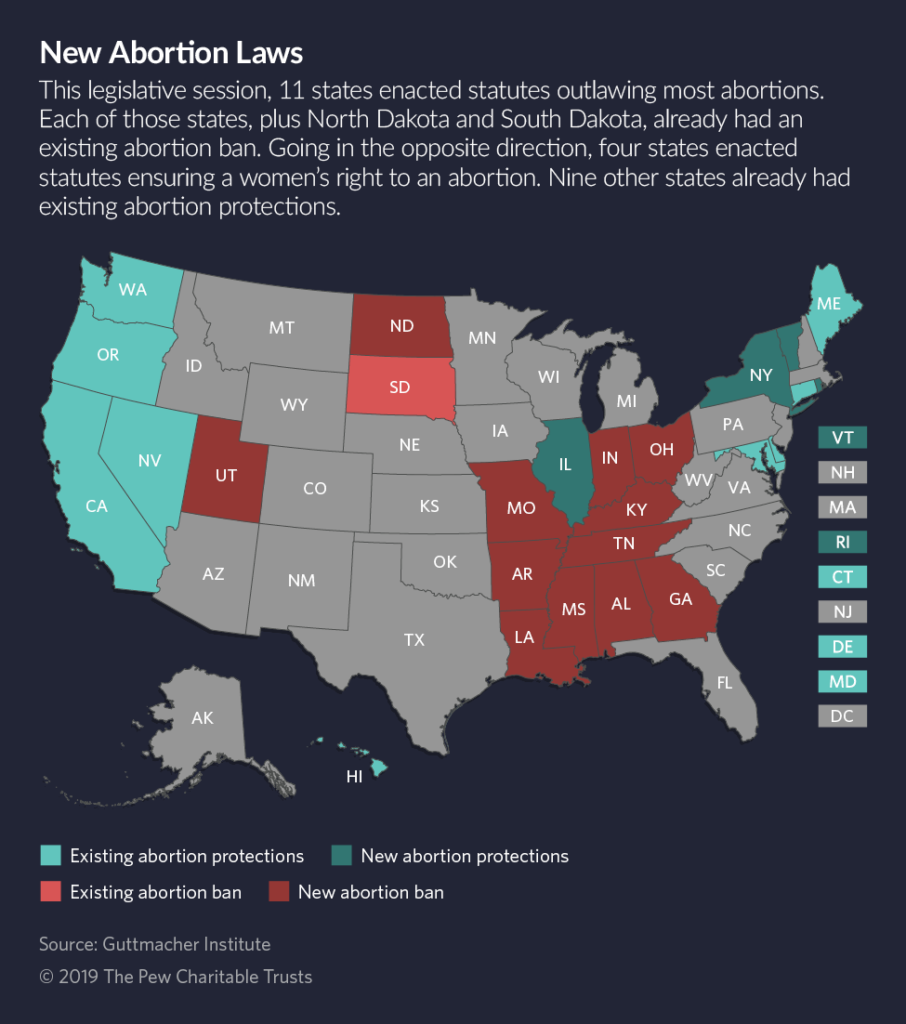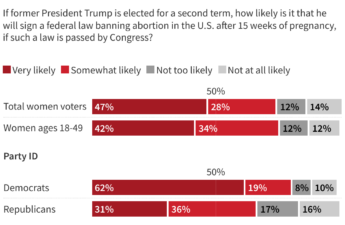
By Christine Vestal, Stateline
This is Part Two of Stateline‘s 2019 Legislative Review.
More state abortion laws were enacted this year than at any time since 1973, the year the U.S. Supreme Court decided in Roe v. Wade that women have a constitutional right to end their pregnancy.
Many of the new laws — either banning or protecting the right to abortion — came in reaction to President Donald Trump’s second nomination of a conservative justice to the high court, creating the possibility that the historic abortion rights decision could be overturned.
The new abortion bans in red states and laws affirming a woman’s right to an abortion in blue states are considered by legal experts to be largely hypothetical since nothing will change unless Roe v. Wade is overturned.
Still, abortion rights advocates consider this year’s attack on reproductive rights far from symbolic.
“It’s a coordinated strategy to overturn Roe and ban abortion,” Alexis McGill Johnson, acting president and CEO of Planned Parenthood, wrote in an email to Stateline. “The threat to our rights and freedoms is not a hypothetical.”
Anti-abortion advocates also maintain that the bans have had a practical effect. According to Clarke Forsythe, senior counsel for the anti-abortion organization Americans United for Life, the new laws have garnered media attention that has had a “salutary” effect by educating the public.
Besides sweeping affirmations of women’s reproductive health rights, a few blue states enacted measures this year that will have an immediate effect on women seeking an abortion, making access easier and more affordable.
Only one notable anti-abortion law that may have an immediate effect on women passed this year, extending a waiting period for abortion in Arkansas. That’s far fewer than in the past few years, in part because of a 2015 Supreme Court finding in Whole Woman’s Health v. Hellerstedt that certain restrictions on abortion facilities represent an “undue burden” for women seeking an abortion.
So far, most abortion bans enacted this year have been enjoined by federal courts. And the others, which aren’t slated to take effect until later this year or in 2020, are under court review.
If the U.S. Supreme Court accepts any of the more than 40 other state abortion lawsuits already under review in federal courts, and if justices decide to reverse Roe v. Wade, this year’s sweeping new abortion bans could take effect, creating a patchwork of state abortion laws that would look much like the one that existed before 1973.
But expert opinions on the likelihood of that happening are mixed.
Meantime, the new laws have widened the gulf between red and blue states on the abortion issue.
“For a long time, you saw a lot of action in conservative states, but liberal states were content with the status quo in abortion policy,” said Michael J. New, an associate scholar at the Charlotte Lozier Institute in Washington, D.C., an anti-abortion research group.
“Now, we’re seeing a big shift in Democratic initiatives in the states, with some states ensuring funding and removing previous abortion restrictions,” he said. “Republicans, on the other hand, have gradually and steadily moved toward more extreme state efforts to protect the unborn over the last two decades.”
Elizabeth Nash, a policy analyst at the abortion-rights Guttmacher Institute, agrees. “The Supreme Court is looming large over these state debates. The last time that people thought Roe was in this kind of jeopardy was the early 1990s. That’s the only other time we saw Democratic-led states adopt protections for abortion.”
Bans and Affirmations
Eleven Republican-dominated states — Alabama, Arkansas, Georgia, Indiana, Kentucky, Louisiana, Mississippi, Missouri, North Dakota, Ohio and Utah — enacted outright abortion bans, largely to spur lawsuits that might prompt the Supreme Court to reconsider its 1973 ruling. None of the laws would take effect unless the court reverses Roe v. Wade. Federal courts have blocked them.
Tennessee, which is also Republican-controlled, enacted a so-called trigger law that would ban abortions only if Roe v. Wade is overturned. Trigger laws, already on the books in seven other states, are not unconstitutional and, therefore, are not subject to federal lawsuits.
All 12 states already had laws that banned abortion in some cases, as well as trigger laws and extensive regulations making it difficult for abortion clinics to operate. The new laws are intended to renew those states’ political intent to outlaw abortion as well as to spur a high court review.
“In most cases, conservative legislators, seeing a shift in the Supreme Court, want their state to be part of a wave of court cases,” Nash said. “There’s also a bit of posturing and jockeying for position as a very conservative state.”

Meanwhile four Democratic-led states — Illinois, New York, Rhode Island and Vermont — enacted new laws affirming a woman’s fundamental right to abortion. Those laws were intended to signal the state’s intent to defend a woman’s right to abortion if Roe v. Wade is overturned, Nash said, while making it harder for politicians to diminish those rights.
They join nine other states — California, Connecticut, Delaware, Hawaii, Maine, Maryland, Nevada, Oregon and Washington — that enacted laws affirming a woman’s right to abortion as early as two decades ago and still have those laws on the books.
More Than Symbolic
In addition to establishing a woman’s right to abortion, New York’s new law, the Reproductive Health Act, repealed a statute that prohibited anyone but a medical doctor from performing an abortion and removed some restrictions on late-term (after 24 weeks) abortions. The state also eliminated a requirement that parents must consent to an abortion performed on their daughter if she is a minor.
Maine, which shifted back to a Democratic-led government this year after eight years under a conservative Republican governor and GOP-led legislature, enacted laws allowing nurse practitioners and physician assistants to perform the procedure and requiring Medicaid to cover abortions for low-income women.
Illinois enacted a law repealing previous restrictions on late-term abortions and a requirement that a woman’s spouse consent to an abortion, as well as other abortion restrictions. The new law also requires private insurers to cover abortions.
Nevada repealed a statute that had imposed criminal charges on an abortion practitioner who failed to follow state regulations.
Massachusetts legislators are still considering a bill known as the ROE Act that would eliminate parental consent requirements and expand the circumstances under which a woman could receive a late-term abortion. Republican Gov. Charlie Baker has said he opposes the bill, but women’s health advocates say that could change.
Legal Challenges
Lawsuits against most abortion bans already have been filed in state courts by women’s health advocates, including Planned Parenthood, the Center for Reproductive Rights, the American Civil Liberties Union and other groups. The American Medical Association also has filed lawsuits against state laws it says would interfere with the patient-doctor relationship.
“It’s extremely disturbing that many states are doing whatever they can to push abortion out of reach,” said Jennifer Dalven, who heads the Reproductive Freedom Project at the American Civil Liberties Union. “We expect the courts will block all of the state bans enacted this year. These laws are not only unconstitutional, but they are not what the public want.”
According to a May poll by CBS News, two-thirds of Americans want Roe v. Wadeto remain in place, while a majority want some restrictions. More Democrats than Republicans tend to support abortion rights but a June poll from NBC News and The Wall Street Journal found that a majority of Republicans (52%) said Roe v. Wade should not be overturned.
Supreme Court watchers disagree about the likelihood of the high court accepting a case that would test Roe v. Wade anytime soon, with few predicting the panel would overturn it. Most experts say the court is more likely to undermine the protections in Roe over time by upholding more abortion restrictions.
With public opinion trending against the reversal of Roe v. Wade, Forsythe said he thinks the full bans enacted this year are less likely than more moderate laws to trigger a Supreme Court ruling on its landmark abortion decision.
Since Justice Brett Kavanaugh joined the Supreme Court in October, the panel already has declined two state abortion cases.
In May, the high court refused to hear a case involving a 2016 Indiana law that would ban abortion based on gender or certain disabilities, including Down syndrome. And in June, it refused to accept a case brought by Alabama seeking to reinstate a 2016 ban on the standard of care for second-trimester abortions, called dilation and extraction, which also is used after some miscarriages.
Although the high court is not obliged to give its rationale when it refuses to consider an appeal from a lower court, legal analysts say the justices’ refusal to take up either of those abortion bans indicates an unwillingness, at least in an election year, to address the issue.
Currently pending before the high court are two additional abortion cases. One involves a 2016 Indiana law requiring that a woman be shown ultrasound images before getting an abortion. Another involves a 2014 Louisiana law requiring doctors who perform abortions to have admitting privileges at a nearby hospital.
“I can’t imagine how you could draft a new law that is so different from the 40-plus cases in the courts right now that it would create a novel test case for Roe v. Wade,” Forsythe said.
Alabama Spotlight
Alabama made national headlines this year, enacting the most extreme anti-abortion legislation in the country. Known as the Alabama Human Life Protection Act, the law would make it a felony for a doctor to perform the procedure at any time during a pregnancy, with no exceptions for rape or incest. The law was scheduled to take effect in November but has been challenged in court.
Republican Gov. Kay Ivey, after signing the law, issued a statement saying, “To the bill’s many supporters, this legislation stands as a powerful testament to Alabamians’ deeply held belief that every life is precious and that every life is a sacred gift from God.”
The bans in Alabama and elsewhere “are causing confusion and fear among patients,” Nimra Chowdhry, state legislative counsel at the Center for Reproductive Rights, told Stateline in an email. “Many of our clients in these states have had patients calling them, asking if they are still able to obtain abortion services in their state.”
In May, after the Alabama legislature passed the abortion ban, reproductive rights advocates chartered a plane to fly a banner over the state Capitol in Montgomery that read: “ABORTION IS OK!”
But even if advocates are successful in convincing people that Alabama’s new law doesn’t make abortion illegal, it still casts a pall over women who are faced with the decision, said 29-year-old Alabama native Bekah Turner, a yoga instructor in Auburn.
“It’s left us feeling more and more unsafe being in a female body, and we have a sense that our rights have been handed over to the state.”
Among her friend group, Turner said, she’s hearing talk about leaving the state because of the new law. “There’s a lot of fear about what the consequences could be in the future. In Alabama, it’s a social taboo to even talk about abortion.
“When you add the implied morality around this new law, it makes the shame and stigma of abortion even heavier. We’re talking about an existential issue for women, because if we can’t own our bodies, how can we feel safe here?”


